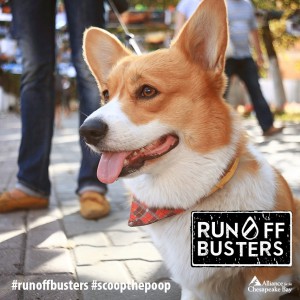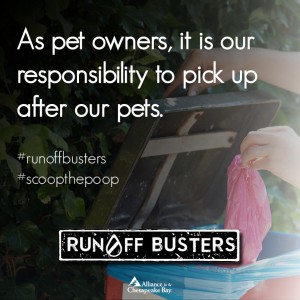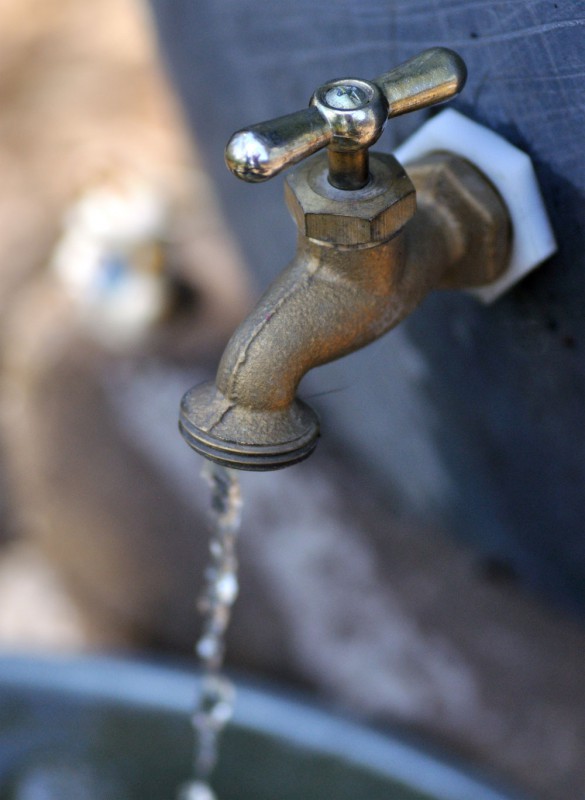Scoop the Poop
 Let’s face it- we all love our pets, yet no one likes picking up after them. But how much trouble does waste from pups and other pets cause? As it turns out, what Fido and Fluffy leave behind can be pretty ruff on the Chesapeake Bay watershed.
Let’s face it- we all love our pets, yet no one likes picking up after them. But how much trouble does waste from pups and other pets cause? As it turns out, what Fido and Fluffy leave behind can be pretty ruff on the Chesapeake Bay watershed.
There are over 84 million dogs living in the United States, creating 22.9 trillion pounds of waste per year – much of which is left on lawns, sidewalks, trails, and parks. According to Doody Calls, a pet waste management service, this could fill a line of tractor-trailers stretching from NYC to Los Angeles and back to Austin, Texas. And that’s only dogs!
All that puppy poo and feline feces can actually cause several water quality issues. Like fertilizer, oil, and sediment, pet waste is considered a non-point source pollutant by the Environmental Protection Agency. That means pet waste contains nutrients like nitrogen and phosphorus that can fuel toxic algal blooms and reduce oxygen levels. If left on the grass, rain will wash these nutrients into storm drains and local waterways, harming the plants and wildlife that live there.
Unlike other runoff culprits we’ve discussed, pet waste also contains bacteria and parasites like ringworm, salmonella, Giardia, and E. coli – to name just a few. Just one gram of dog waste can contain up to 23 million fecal coliform bacteria.  This is known to cause serious health problems in humans, like intestinal illness and kidney disorders. Once these water-borne pathogens enter the watershed, it can make it unfit for swimming and other recreational activities.
This is known to cause serious health problems in humans, like intestinal illness and kidney disorders. Once these water-borne pathogens enter the watershed, it can make it unfit for swimming and other recreational activities.
As pet owners, it is our responsibility to pick up after our pets. Even this simple act can have a huge impact on the health of local waterways and the Chesapeake Bay.
Here are some Runoff Busters-approved “Doo”s and Don’ts to make man’s best friend the Bay’s best friend too:
“Doo”s:
- Flush the poo down the toilet, throw it in the trash, or bury it six inches deep in the ground (sans plastic bag).
- Use designated pet waste stations where available.
- Bring a small trowel or “pooper-scooper” during walks and re-use a plastic shopping bag for easy disposal.
- Tie plastic bags to your dog’s leash, and store a few in your car.
- Take the “Scoop the Poop” pledge.
Don’ts:
- Don’t forget to scoop the poop in your own yard! (Especially before it rains).
- Don’t let your pet take care of business directly on the pavement- choose a grassy area instead.
- Don’t place pet poop in a compost pile. Yes, manure can sometimes be used as fertilizer, but only when it comes from herbivores like horses or cows.
For more information, visit:
Habits to Help: Pet Waste (via Alliance for the Chesapeake Bay)
Scoop the Poop (via AskHRgreen.org)
Scoop the Poop (via Elizabeth River Project)
James River experts urge dog owners to ‘Scoop the Poop’ (via WTVR)
